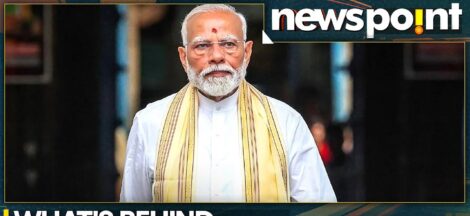By Ashis Biswas
As the pre-election campaign for state assembly polls in Tripura and Meghalaya warms up, new entrant Bengal-based Trinamool Congress (TMC) faces unexpected challenges. For a state-based party still chasing a ‘national’ status, the first priority for the Mamata Banerjee-led outfit is to win a respectable number of seats in both States.
Senior TMC leaders have explained to party workers currently engaged in the Northeast the importance of emerging at least as the runner-up party in one state. To do well in the Northeast elections has acquired greater importance in the context of the TMC’s earlier abysmal failures in the Goa Assembly polls and the Tripura Civic elections, some time ago.
Political prestige aside, TMC leaders acknowledge they would not get many more opportunities to expand their organisations beyond Bengal, after the proposed March elections in the Northeast. Altogether nine major states including Haryana, Chhattisgarh and Telangana are scheduled to go to polls next year. But the TMC will hardly be a factor in those.
Participating in Tripura and Meghalaya polls in 2023 would enable most outfits and groups opposing the ruling Bharatiya Janata Party(BJP) with a preparatory run up for the Lok Sabha elections coming up in 2024, too.
As in West Bengal, the hallmark of the TMC’s political campaigning in the Northeast so far has been the party’s continuing stress on what has come to be called a propagation of its ‘freebies’ culture for the poor There is only a token mention by TMC leaders addressing rallies etc, of future development programmes or economic-asset building.
Typically, for women in Meghalaya the party has promised a monthly handout of at least Rs 1000, to empower them economically. In Goa a sum of Rs 5000 was promised on this head –whereas in Bengal itself, only Rs 500 a month is the going allowance for women. Such widespread discrepancy has not gone unnoticed in West Bengal and has led to caustic comments.
An additional problem is that much of the money intended to help the relatively poorer women in Bengal also goes to the more affluent segments, there being no criteria to separate the haves from the have-nots!
This is not to suggest that the TMC has not picked on local issues of importance to highlight in its NE campaign. In Meghalaya, party Supremo Mamata Banerjee herself, strongly attacked the BJP-ruled Government headed by Chief Minister Himanta Biswa Sarma for the killing of six persons by the Assam police in November this year. The incident occurred near the Mukroh village in Meghalaya’s West Jaintia hills.
More recently, the TMC has followed this up by targeting the BJP again over the recent controversy over the disclosure of a recent circular — once more! — from the Special branch of the Assam police. There were explicit instructions to the police force to report on the number of churches operating in the NE region, together with details of their activities, with special emphasis to check if any major conversion drives were being conducted among locals etc.
As expected, there were angry protests from the powerful Christian organisations all over the NE states, including Meghalaya. Many non Christian organisations and political parties opposing the BJP also joined such protests and issued press statements.
Mr Sarma, sensing the public mood, promptly issued a denial of the so-called SB directive, which had been circulated without official approval, he declared. It had no validity. But the political damage had been done. The avalanche of protests continues. The BJP was strongly condemned for pursuing its ‘divisionist policies’ in a region known for its religious tolerance and warm ethnic relations among communities—so aver most political parties.
As a party fighting the BJP, the TMC’s Meghalaya unit jumped into the fray, adding their voices to the anti-BJP chorus that had arisen over the issue. Mr Sarma’s routine denial did not convince many, mainly because of what is generally seen as the uncompromising nature of his pro-Hindutva policies, which unlike other leaders, he does not hesitate to propagate.
Mr Sarma also lost some points recently in the credibility stakes, over the marked shift in his statements over the killing of six people. As senior Meghalaya pointed out, initially he admitted that Assam policemen were to blame for what had occurred. Later however in the state Assembly, he significantly hardened his stand and downplayed the role of the Assam police, to the annoyance of Meghalaya authorities.
As a party, the TMC has always preened itself as being ‘the strongest opponent of the BJP’. Therefore its strongly anti-BJP position on both the Assam-Meghalaya border killings and the controversial police ’circular’ about Christian organisations is understandable to observers. However, what separates the TMC from other opposition parties in Meghalaya is the occasional virulence displayed in its anti-BJP rhetoric. NE-based media has taken note of this. For instance, some reports have mentioned the ‘inflammatory’ nature of the speeches delivered by TMC leaders over the recent killings in the border areas.
Similarly, there are worries among a section of TMC followers in Meghalaya, mostly Bengalis, about the party’s wholehearted backing of Christian organisations protesting against the Government of Assam’s ‘circular’. Some of these mostly tribal organisations have not hesitated to brand all Bengalis in the Northeast as ‘Bangladeshis’ and therefore as ‘illegal settlers’.
Would the TMC opt to choose a support base among hardline Khasis and Garos, rather than about the considerable numbers of non tribal citizens/voters like Bengalis and Hindi-speaking Biharis in the region? There have been no clear answers within the TMC.
At the other end, the party’s campaign in Tripura has just got more difficult, with the BJP-ruled Tripura Government announcing a 12% increase in their Dearness allowance payments for the state Government employees. In terms of talking points at public rallies, the position is acutely embarrassing for the TMC, which has not paid lakhs of West Bengal Government employees their DA over the years, resulting a net 35% deficit between central and West Bengal Government employees!
The TMC government in Bengal has spent crores of rupees fighting mostly losing legal battles in the Kolkata high court and the Supreme Court over the pending DA for government employees, during the last few years. According to legal practitioners engaged in such disputes at the Apex court level, the cumulative DA dues to Bengal government employees currently amount to at least Rs 23,000 crore.
It remains to be seen how the TMC counters the BJP’s advantage in Tripura in dealing with such issues during the ongoing no-holds barred campaign. (IPA Service)



